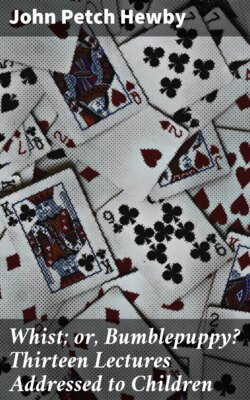Читать книгу Whist; or, Bumblepuppy? Thirteen Lectures Addressed to Children - John Petch Hewby - Страница 4
На сайте Литреса книга снята с продажи.
LECTURE I.
——
INTRODUCTORY.
——
ОглавлениеTable of Contents
“Vacuis committere venis
Nil nisi lene decet.”—Eton Grammar.
“Those that do teach young babes
Do it with gentle means and easy tasks.”—Shakespeare.
As, humanly speaking, you will probably play something for the next fifty years, should you select either Whist or Bumblepuppy,[1] it will be as well for your own comfort—the comfort of others is a minor consideration[2]—to have some idea of their general principles; but first you must decide which of these two games you intend to play, for though they are often confounded together, and are both supposed to be governed by the same ninety-one laws and a chapter on etiquette, they differ much more distinctly than the chalk and cheese of the present day. Professor Pole in his “Theory of Whist,” Appendix B, has made a very skilful attempt (by modifying the maxims of Whist) to make the two games into a kind of emulsion. I was rather taken with this, and having been informed that the most incongruous materials will mix, if you only shake them together long enough, I have given this plan a fair trial, and failed.
It may be that I had not sufficient patience and perseverance, but the principal cause of failure I found to be this: the Bumblepuppist, like Artemus Ward’s bear, “can be taught many interesting things but is unreliable;” he only admires his own eccentricities, and if a person of respectable antecedents gets up a little pyrotechnic display of false cards for his own private delectation, the Bumblepuppist utterly misses the point of the joke, he fails even to see that it is clever: if such a comparison may be drawn without offence, he doesn’t consider that what is sauce for the goose is sauce for the gander.
In the face of this difficulty, I should recommend you to treat them as separate games: as you go down in one scale and up in the other they closely approximate; that extremes meet is a law of nature, and between the worst Whist and the best Bumblepuppy it is almost impossible to draw the line.
Other elementary forms, protozoa for instance, are often so much alike that it is difficult to decide whether they are plants or animals; but representative specimens of each game, beyond being found at the same table, (in scientific slang, having the same habitat,) have scarcely one point in common, you might just as reasonably mistake horse-radish for beef.
If you elect Whist (I shall refer to the laws later on) begin by learning the leads, and the ordinary play of the second, third and fourth hand, which you will find in any Whist Book;[3] this can be done in a few days; then after cutting for partners (see note to Law 14) as soon as the cards are dealt, not before (see note to Law 45),
(1) Take up your hand;
(2) Count your cards (see notes to Laws 42 & 46);
(3) Sort them into suits;
(4) Look them over carefully;
(5) Fix firmly in your memory not only the trump suit but the trump card, then
(6) Give your undivided attention to the table, it is there and not in your hand the game is played;
(7) See every card played in the order it is played;[4]
(8) When you deal, place the trump card apart from the rest of the suit, that you may know at once which it is.
N.B.—Knowing is always better than the very best thinking, and generally much more easy: by these simple means you get rid at once and for ever of all such childish interruptions as “draw your card!” “who led?” “what are trumps?” “show me the last trick!” and so ad infinitum, which, by their constant repetition, not merely worry and annoy the rest of the table, but tend to destroy any clue to the game that you yourself might otherwise possess.
It is a good plan to sit clear of the table, and then if you are constrained to drop a few cards, they at any rate fall on the floor, where they cannot be called.
So far, I have assumed your object to be Whist; if your end and aim is Bumblepuppy, you need do none of these things; you can learn the leads and the recognised play—more or less imperfectly—in a few years by practice, or you can leave them unlearned;
“Build by whatever plan caprice decrees,
With what materials, on what ground you please.”
Cowper.
ignorance imparts variety to the game, and variety is charming. You can set all laws at defiance, and if any one objects—after much wrangling—you can refer the matter in dispute to the Westminster Papers,[5] and hang it up for a month certain: (this is a better plan than writing to the Field, for there you only get a week’s respite).
Should you be in any doubt whether Whist or the other game is your vocation, the first half-dozen times you play make it a rule never to look at the last trick—
“Things that are past are done with.”—Shakespeare.
and if at the end of that time you find the difficulty insuperable, give up, as hopeless, all idea of becoming a Whist player.
